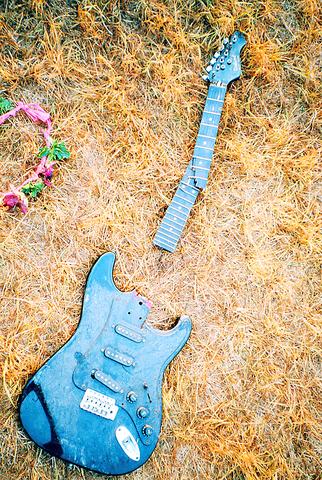Organizers for the annual four-day music festival Spring Scream, now in its ninth year and one of Taiwan's largest concerts, declared that it will take place from April 3 to April 6 at the Liufu Ranch (六福山莊), the same site at which it was held last year.
Last year's Spring Scream included performances by 160 local and foreign bands -- most of them far from mainstream -- on four stages for four days of music, drawing an estimated crowd of 3,000, according to organizer Wade Davis. This year's event will see only minor changes to that format, with the number of bands possibly slightly reduced to make for less hectic scheduling, he said. Band registration deadlines have also been moved up, with the final deadline set for two days from now, Sunday, March 10. According to Davis, at least 140 bands have registered so far, with all registration taking place through the Spring Scream Web site (http://www.springscream.com). Returning foreign acts will include Mimie Chan from Japan, King Lychee from Hong Kong and 40 Minutes of Hell and Q from the US.
The biggest difference this year will probably be in the event's awareness of interest directed towards it as well as the scene that has sprung up around it. Last year, at least three large raves were held in Kenting on the same weekend, one of which received widespread negative publicity after police raided it for drugs. So far Spring Scream has only alluded to this through a FAQ on its Web site posted earlier this week. The FAQ's second entry simply reads: "Is Spring Scream a rave? No." However Davis said that the event may comment further in upcoming weeks, likely issuing its first ever press release to local Chinese media in order to clarify differences between it and the concurrently held raves.

PHOTO COURESTY OF SPRING SCREAM
In addition to bands, Spring Scream will again include a half pipe for skateboarders and events related to visual arts and film. Ticket prices have not yet been announced, but four day passes have cost NT$1,000 each year since 1999. Last year in an effort to boost advanced sales, four day passes were only sold in advance and on-site day passes cost NT$500. To make sales simpler and more accessible this year, Davis said they are considering selling tickets through a system that would involve banks' automated teller machines and the Internet.

The primaries for this year’s nine-in-one local elections in November began early in this election cycle, starting last autumn. The local press has been full of tales of intrigue, betrayal, infighting and drama going back to the summer of 2024. This is not widely covered in the English-language press, and the nine-in-one elections are not well understood. The nine-in-one elections refer to the nine levels of local governments that go to the ballot, from the neighborhood and village borough chief level on up to the city mayor and county commissioner level. The main focus is on the 22 special municipality

The People’s Republic of China (PRC) invaded Vietnam in 1979, following a year of increasingly tense relations between the two states. Beijing viewed Vietnam’s close relations with Soviet Russia as a threat. One of the pretexts it used was the alleged mistreatment of the ethnic Chinese in Vietnam. Tension between the ethnic Chinese and governments in Vietnam had been ongoing for decades. The French used to play off the Vietnamese against the Chinese as a divide-and-rule strategy. The Saigon government in 1956 compelled all Vietnam-born Chinese to adopt Vietnamese citizenship. It also banned them from 11 trades they had previously

In the 2010s, the Communist Party of China (CCP) began cracking down on Christian churches. Media reports said at the time that various versions of Protestant Christianity were likely the fastest growing religions in the People’s Republic of China (PRC). The crackdown was part of a campaign that in turn was part of a larger movement to bring religion under party control. For the Protestant churches, “the government’s aim has been to force all churches into the state-controlled organization,” according to a 2023 article in Christianity Today. That piece was centered on Wang Yi (王怡), the fiery, charismatic pastor of the

Hsu Pu-liao (許不了) never lived to see the premiere of his most successful film, The Clown and the Swan (小丑與天鵝, 1985). The movie, which starred Hsu, the “Taiwanese Charlie Chaplin,” outgrossed Jackie Chan’s Heart of Dragon (龍的心), earning NT$9.2 million at the local box office. Forty years after its premiere, the film has become the Taiwan Film and Audiovisual Institute’s (TFAI) 100th restoration. “It is the only one of Hsu’s films whose original negative survived,” says director Kevin Chu (朱延平), one of Taiwan’s most commercially successful